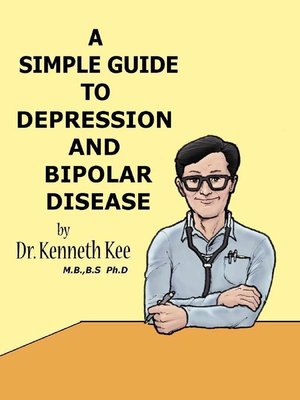A Simple Guide to Depression and Bipolar Disease
ebook ∣ A Simple Guide to Medical Conditions, no. 18 · Simple Guide to Medical Conditions
By Kenneth Kee

Sign up to save your library
With an OverDrive account, you can save your favorite libraries for at-a-glance information about availability. Find out more about OverDrive accounts.
Find this title in Libby, the library reading app by OverDrive.



Search for a digital library with this title
Title found at these libraries:
| Library Name | Distance |
|---|---|
| Loading... |
Depression is a medical condition in which feelings of persistent sadness, loss, emptiness, anger, or frustration interfere with everyday life for at least 2 weeks or longer.There are 3 types of Depression:1. Major depressionMajor depression is characterized by a combination of symptoms that last for at least two weeks in a row, including sad and irritable mood that interfere with the ability to work, sleep, eat, and enjoy activities which used to give pleasure.There may be difficulties in sleeping or eating.2. DysthymiaDysthymia is a less severe illness but usually longer-lasting type of depression than major depression (2 years or more).It involves long-term symptoms that do not stop but at the same time prevent the affected person from functioning properly or feeling good.People with dysthymia can also have episodes of major depression.This combination of these two types of depression is often referred to as double-depression.3. Bipolar disorder (manic depression)Another type of depression is bipolar disorderThis involves a group of mood swing disorders that were formerly called manic-depressive illness or manic depression.These conditions may be inherited.It is not as common as the other types of depressive disorders.Bipolar disorders have cycles of mood changes that include at least one episode of mania or hypomania and episodes of depression as well.Bipolar disorders are long lasting and recurring.Sometimes, the mood swings are fast and dramatic.More often they are gradual.During the depression episode, the person can experience any or all of the symptoms of a depressive disorder.In the manic cycle, mania often affects thinking, judgment, and social behavior in ways that cause serious problems and embarrassment.What are the causes of Depression?1. The cause of depression is not known.In recent years, many researchers believe it is caused by2. chemical changes in the brain.Neurotransmitters are released by a neuron directly onto a recipient cell, while hormones typically reach their target cell via the bloodstream.3. the genes,4. certain stressful events.5. More likely, it's a combination of all.Some types of depression are familial.But depression can also occur even if you have no family history of the illness.Anyone can develop depression of all ages even kids 8% of teens and 2% of preteens..Who is at risk of Depression?The following may play a role in depression:1. Alcohol or drug abuse2. Some medical conditions, including underactive thyroid, cancer, or long-term pain3. Certain medications such as steroids4. Sleeping problems5. Stressful life events, such as:a. Breaking up with a girlfriend or boyfriendb. Failing a classc. Death or illness of someone closed. Divorcee. Childhood abuse or neglectf. Job lossg. Social isolation especially in the elderlyWhat are the symptoms of Depression?Symptoms:1. a persistent sad mood2. loss of interest or pleasure in most activitiestogether with following accompanying symptoms1. more negative attitude, disbelief that any problem or situation can be solved in a positive way.2. Feelings of helplessness and hopelessness3. Feelings of worthlessness, self-hate, and guilt4. Becoming withdrawn or isolated5. Loss of interest or pleasure in activities which were once enjoyable6. Restlessness, irritability and agitation,7. Great change in appetite, often with weight gain or loss8. Very difficult to concentrate9. Fatigue and Tiredness10. Thoughts of death or suicide11. Trouble sleeping or excessive sleeping12. Anger and discouragement sometimes, rather than feelings of sadness.If depression is very severe, psychotic symptoms may appear, such as13. Hallucinations and delusions.TABLE OF CONTENTChapter 1DepressionChapter 2Bipolar DiseaseChapter...







